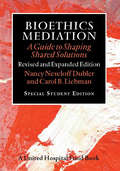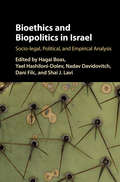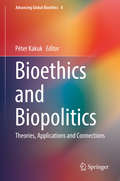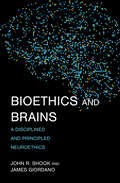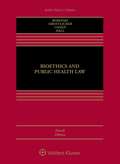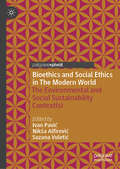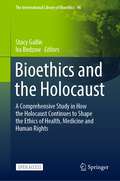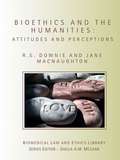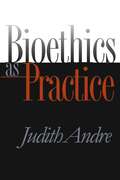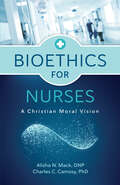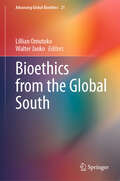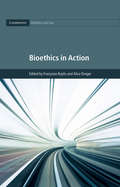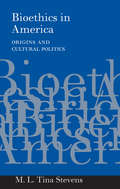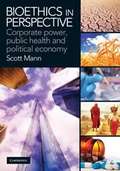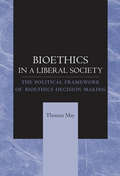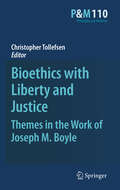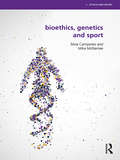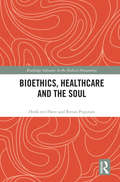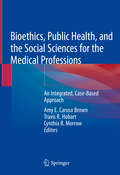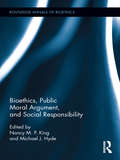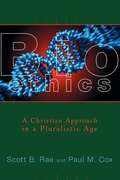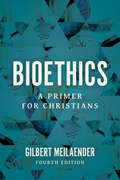- Table View
- List View
Bioethics Mediation: A Guide to Shaping Shared Solutions, Revised and Expanded Edition
by Nancy Neveloff Dubler Carol B. LiebmanBioethics Mediation offers stories about patients, families, and health care providers enmeshed in conflict as they wrestle with decisions about life and death. It provides guidance for those charged with supporting the patient's traditional and religious commitments and personal wishes. Today's medical system, without intervention, privileges those within shared cultures of communication and disadvantages those lacking power and position, such as immigrants, the poor, and nonprofessionals. This book gives clinical ethics consultants, palliative care providers, and physicians, nurses, and other medical staff the tools they need to understand and manage conflict while respecting the values of patients and family members. Conflicts come in different guises, and the key to successful resolution is early identification and intervention. Every bioethics mediator needs to be prepared with skills to listen, "level the playing field," identify individual interests, explore options, and help craft a "principled resolution" -- a consensus that identifies a plan aligned with accepted ethical principles, legal stipulations, and moral rules and that charts a clear course of future intervention. The organization of the book makes it ideal for teaching or as a handbook for the practitioner. It includes actual cases, modified to protect the privacy of patients, providers, and institutions; detailed case analyses; tools for step-by-step mediation; techniques for the mediator; sample chart notes; and a set of actual role plays with expert mediator and bioethics commentaries. The role plays include: - discharge planning for a dying patient - an at-risk pregnancy - HIV and postsurgical complications in the ICU - treatment for a dying adolescent - dialysis and multiple systems failure Expanded by two-thirds from the 2004 edition, the new edition features two new role plays, a new chapter on how to write chart notes, and a discussion of new understandings of the role of the clinical ethics consultant.
Bioethics and Biopolitics in Israel: Socio-legal, Political, and Empirical Analysis
by Shai J. Lavi Hagai Boas Hashiloni-Dolev Yael Nadav Davidovitch Dani FilcAlthough the 'Israeli case' of bioethics has been well documented, this book offers a novel understanding of Israeli bioethics that is a milestone in the comparative literature of bioethics. Bringing together a range of experts, the book's interdisciplinary structure employs a contemporary, sociopolitical-oriented approach to bioethics issues, with an emphasis on empirical analysis, that will appeal not only to scholars of bioethics, but also to students of law, medicine, humanities, and social sciences around the world. Its focus on the development of bioethics in Israel makes it especially relevant to scholars of Israeli society - both in and out of Israel - as well as medical practitioners and health policymakers in Israel.
Bioethics and Biopolitics: Theories, Applications and Connections (Advancing Global Bioethics #8)
by Péter KakukThis volume links three different theoretical approaches that have a common focus on the relationship between biopolitics and bioethics. This collection of papers can be categorized into different domains that are representative of the contemporary usage of biopolitics as a concept. On the one hand, several chapters develop a clear and up-to-date understanding of the primary sources of the concept and related theories of Agamben, Negri or Foucault and approach the question of relevance within the field of bioethics. Another group of papers apply the philosophical concepts and theories of biopolitics (biopower, Homo Sacer, biocitizenship) on very specific currently debated bioethical issues. Some scholars rely on the more mundane understanding of (bio)politics and investigate how its relationship with bioethics could be philosophically conceptualized. Additionally, this work also contains papers that follow a more legally oriented analysis on the effects of contemporary biopolitics on human rights and European law. The authors are philosophers, legal scholars or bioethicists. The major strength of this volume is to provide the reader with major insights and orientation in these different contemporary usages of the concept and theories of biopolitics, within the context of its various ethically relevant applications.
Bioethics and Brains: A Disciplined and Principled Neuroethics (Basic Bioethics)
by John R. Shook James GiordanoHow neuroethics can be increasingly relevant and informative for inclusive social policy and political discourse about brain science and technologies.Neuroethics, a field just over two decades old, addresses both ethical issues generated in and by brain sciences and the neuroscientific studies of moral and ethical thought and action. These foci are reciprocally interactive and prompt questions of how science and ethics can and should harmonize. In Bioethics and Brains, John R. Shook and James Giordano ask: How can the brain sciences inform ethics? And how might ethics guide the brain sciences and their real-world applications?The authors&’ structure for a disciplined neuroethics reconciles science and ethics by requiring ethical principles consistent with moral neuroscience and moral psychology. Their cosmopolitan perspective looks beyond Western theories toward a new metaethics for neuroethics and illustrates its approach in chapters that address the issues and approaches to questions and problems generated by the proliferation of neurotechnology in global contexts. Shook and Giordano posit that neuroethics can merge science and ethics toward establishing global consensus on guiding brain research, neurotechnological innovation, and grounding neurorights.
Bioethics and Disability
by Alicia OuelletteBioethics and Disability provides tools for understanding the concerns, fears, and biases that have convinced some people with disabilities that the health care setting is a dangerous place and some bioethicists that disability activists have nothing to offer bioethics. It wrestles with the charge that bioethics as a discipline devalues the lives of persons with disabilities, arguing that reconciling the competing concerns of the disability community and the autonomy-based approach of mainstream bioethics is not only possible, but essential for a bioethics committed to facilitating good medical decision making and promoting respect for all persons, regardless of ability. Through in-depth case studies involving newborns, children, and adults with disabilities, Bioethics and Disability proposes a new model for medical decision making that is both sensitive to and sensible about the fact of disability in medical cases. Disability-conscious bioethics will bring together disability experts and bioethicists to identify and mitigate disability bias in our health care systems.
Bioethics and Public Health Law (Aspen Select)
by Mark A. Hall Mary Anne Bobinski David Orentlicher I. Glenn CohenFinancial and ethical issues are integrated into this concise and engaging treatment of Bioethics and Public Health Law. The complex relationship between patients, providers, the state, and public health institutions are explored through high-interest cases, informative notes, and compelling problems. The updated Fourth Edition includes recent cases and developments in biotechnology, including stem cell research and gene patents, and updates to HIPPA coverage, DNA research, and bio-banks. Discussions of confidentiality and informed consent include new legislative and judicial responses to posthumous reproduction and the challenges arising from international reproductive tourism.
Bioethics and Social Ethics in The Modern World: The Environmental and Social Sustainability Context(s)
by Nikša Alfirević Ivan Pavić Suzana VuletićThis book explores the philosophical analysis of attitudes and values and sustainable behaviors in fields such as healthcare, social sciences, economics in the context of environmental studies. It firstly investigates the fundamental concept of bioethics with relevant case studies related to the issues of human life and preservation of dignity. The authors then move on to discuss the application of (bio)ethical principles in contemporary society and within the market economy. The last part of the book brings together a variety of perspectives on the general philosophical and ethical foundations of sustainable behavior based on the idea of human dignity. This book offers a guide to understanding responsible sustainability practices in various fields, while considering the social benefits and economic effectiveness of sustainable behaviors.
Bioethics and the Holocaust: A Comprehensive Study in How the Holocaust Continues to Shape the Ethics of Health, Medicine and Human Rights (The International Library of Bioethics #96)
by Ira Bedzow Stacy GallinThis open access book offers a framework for understanding how the Holocaust has shaped and continues to shape medical ethics, health policy, and questions related to human rights around the world. The field of bioethics continues to face questions of social and medical controversy that have their roots in the lessons of the Holocaust, such as debates over beginning-of-life and medical genetics, end-of-life matters such as medical aid in dying, the development of ethical codes and regulations to guide human subject research, and human rights abuses in vulnerable populations. As the only example of medically sanctioned genocide in history, and one that used medicine and science to fundamentally undermine human dignity and the moral foundation of society, the Holocaust provides an invaluable framework for exploring current issues in bioethics and society today. This book, therefore, is of great value to all current and future ethicists, medical practitioners and policymakers – as well as laypeople.
Bioethics and the Humanities: Attitudes and Perceptions (Biomedical Law and Ethics Library)
by Jane Macnaughton Robin DownieCritiquing many areas of medical practice and research whilst making constructive suggestions about medical education, this book extends the scope of medical ethics beyond sole concern with regulation. Illustrating some humanistic ways of understanding patients, this volume explores the connections between medical ethics, healthcare and subjects, such as philosophy, literature, creative writing and medical history and how they can affect the attitudes of doctors towards patients and the perceptions of medicine, health and disease which have become part of contemporary culture. The authors examine a range of ideas in medical practice and research, including: the idea that patient status or the doctor/patient relationship can be understood via quantitative scales the illusion fostered by medical ethics that doctors, unlike those in other professions, are uniquely beneficent and indeed altruistic. An excellent text for undergraduate and postgraduate students of law, medical ethics and medical healthcare law, Bioethics and the Humanities shows the real ethical achievements, problems and half-truths of contemporary medicine.
Bioethics as Practice
by Judith Andre<P>Those who work in bioethics and the medical humanities come from many different backgrounds, such as health care, philosophy, law, the social sciences, and religious studies. The work they do also varies widely: consulting on ethical issues in patient care, working with legislatures, dealing with the media, teaching, speaking, writing and more. <P>Writing as a participant in this developing field, Judith Andre offers a model to unify its diversity. Using the term "bioethics" broadly, to include all the medical humanities, she articulates ideals for the field, identifies its temptations and moral pitfalls, and argues for the central importance of certain virtues. Perhaps the most original of these is the virtue of choosing projects well, which demands not only broadening the field's focus but also understanding the forces that have kept it too narrow. Andre offers an imaginative analysis of the special problems presented by interdisciplinary work and discusses the intellectual virtues necessary for its success. She calls attention to the kinds of professional communities that are necessary to support good work. <P>The book draws from interviews with many people in the field and from the findings of social scientists. It includes the author's personal reflections, several extended allegories, and philosophical analysis. <P>Those who work in bioethics and the medical humanities come from many different backgrounds: health care, philosophy, law, social sciences, religious studies, and more. The work they do also varies widely. Writing as a participant in this developing field, Judith Andre offers a model to unify its diversity. Using the term "bioethics" broadly, to include all the medical humanities, she articulates ideals for the field, identifies its temptations and moral pitfalls, and argues for the central importance of certain virtues.-->
Bioethics for Nurses: A Christian Moral Vision
by Charles C. Camosy Alisha N. MackRecovering the foundation of faith in a profession enduring the pressures of a rapidly changing health-care system.If you are one of the millions of Christian nurses or nursing students in the United States, you already know that there is no real way to separate your faith commitments from your professional vocation—nor would you want to. Especially amid the bedlam of the COVID-19 pandemic, faith has given countless nurses the strength to carry on and be there for their patients, one exhausting shift after another.Bioethics for Nurses, the first book of its kind, is for nurses and nurses in training who still believe in treating the whole person—not just their medical condition. It is for those committed to living out the love of Jesus Christ through the warm, relational care they provide for all hurting and vulnerable people—including those in underserved populations—each of whom has the dignity of a human being made in the image of God. It is also for those who rightly see themselves as crucial members of medical teams alongside doctors (and sometimes without doctors present at all), empowered to exercise professional judgment while protecting their consciences.With the combined wisdom of Alisha Mack, a professor of nursing with many years of clinical experience, and Charles Camosy, an award-winning bioethicist and theologian, Bioethics for Nurses advances a vision for a holistic Christian notion of health care with practical applications for everyday relevance on the job. Through a series of case studies in the second part of the book, Mack and Camosy explore the ethics of specific situations with far-reaching implications for nurses working in a range of fields. In the last part, the authors reflect on the future of nursing after COVID-19, making this an especially timely book for a pivotal moment in the history of the profession. Now, more than ever before, the wisdom of the ancient tradition of Christianity is needed to speak into the profound contemporary realities we are facing together as a culture.
Bioethics from the Global South (Advancing Global Bioethics #21)
by Lillian Omutoko Walter JaokoThis book tackles complex global issues like vaccination, climate change, environmental ethics, embryo adoption, and surrogate motherhood viewed from the perspective of the global south. The COVID-19 pandemic has emphasized the need for addressing bioethical issues on a global scale, beyond national and regional boundaries. Challenges highlighted in the book include cultural differences, multi-pluralism, insufficient funding, and limited opportunities for awareness and provision of education in global bioethics, particularly in low and middle-income countries. The book employs universal and global bioethics frameworks, referencing the Universal Declaration of Human Rights and the UNESCO Universal Declaration on Bioethics and Human Rights. These documents, along with other international agreements and national constitutions were used to advocate for human dignity, health, and fundamental freedoms. Contributions from authors in Kenya, Uganda, and Nigeria provide valuable perspectives, making this book a must-read for ethicists, bioethicists, medical students, and healthcare workers with an interest in global bioethics.
Bioethics in Action (Cambridge Bioethics And Law)
by Françoise Baylis Alice DregerSpeaking from and to the growing movement among academics to become involved with 'socially-engaged' work, this volume presents first-person case studies of attempts to fix serious ethical problems in medical practice and research. It highlights the critical difference between the pundit approach to bioethics and the interventional approach - the talkers and the doers - and points to how abused and damaged the doers often end up.<P><P> Chapters cover a diverse set of topics, including the troubling influence of for-profit businesses on public health policy, the politics of exposing histories of unjust medical research, the challenges of patient rights' work in sexuality and reproduction, collaborations between NGOs and academics, methods for changing entrenched yet harmful medical practices, engaging public policy through educating governmental leaders, and whistleblowing. The trending interest in the interplay of academia and advocacy and the growing importance of 'socially-engaged' work by academics make this a timely and much-needed resource.<P> A much-needed resource for those working and teaching bioethics, health law, research integrity, research ethics, public policy, medical technology and pharmaceutical development, governmental affairs, the history and philosophy of science and medicine, journalism, media studies, and non-profit administration and advocacy.<P> Explores the relationships between: scholarship and advocacy; medical ethics and health law; medical care and medical research; public and private sectors; journalism and scholarship; and governmental and non-governmental actors.<P> Provides practical approaches and warnings about intervening in thorny ethical issues.<P>
Bioethics in America: Origins and Cultural Politics
by M. L. StevensIn Bioethics in America, Tina Stevens challenges the view that the origins of the bioethics movement can be found in the 1960s, a decade mounting challenges to all variety of authority. Instead, Stevens sees bioethics as one more product of a "centuries-long cultural legacy of American ambivalence toward progress," and she finds its modern roots in the responsible science movement that emerged following detonation of the atomic bomb.Rather than challenging authority, she says, the bioethics movement was an aid to authority, in that it allowed medical doctors and researchers to proceed on course while bioethicists managed public fears about medicine's new technologies. That is, the public was reassured by bioethical oversight of biomedicine; in reality, however, bioethicists belonged to the same mainstream that produced the doctors and researchers whom the bioethicists were guiding.
Bioethics in Perspective
by Scott MannIn Bioethics in Perspective Scott Mann demonstrates the importance of issues of corporate power, global inequality and sustainability in shaping health outcomes around the world. The text develops a comprehensive ethical and practical critique of the neoliberal economic ideas which have guided policy in the English-speaking world. It explores the consequences of such policies for health and healthcare around the world, in terms of increasing health inequalities, serious food and water shortages, inadequate health care provision and the marketing of dangerous and unnecessary drugs. With clear proposals for political and economic reform to effectively address these problems, Bioethics in Perspective provides an important counterbalance to much conventional commentary on bioethics. It takes readers with little or no prior knowledge of ethics, economics or medicine quickly and easily into advanced debates and discussions about the causes and consequences of health and illness around the world.
Bioethics in a Liberal Society: The Political Framework of Bioethics Decision Making
by Thomas MayIssues concerning patients' rights are at the center of bioethics, but the political basis for these rights has rarely been examined. In Bioethics in a Liberal Society: The Political Framework of Bioethics Decision Making, Thomas May offers a compelling analysis of how the political context of liberal constitutional democracy shapes the rights and obligations of both patients and health care professionals. May focuses on how a key feature of liberal society—namely, an individual's right to make independent decisions—has an impact on the most important relational facets of health care, such as patients' autonomy and professionals' rights of conscience.Although a liberal political framework protects individual judgments, May asserts that this right is based on the assumption of an individual's competency to make sound decisions. May uses case studies to examine society's approach to medical decision making when, for reasons ranging from age to severe mental disorder, a person lacks sufficient competency to make independent and fully informed choices. To protect the autonomy of these vulnerable patients, May emphasizes the need for health care ethics committees and ethics consultants to help guide the decision-making process in clinical settings. Bioethics in a Liberal Society is essential reading for all those interested in understanding how bioethics is practiced within our society.
Bioethics with Liberty and Justice: Themes in the Work of Joseph M. Boyle (Philosophy and Medicine #110)
by Christopher TollefsenJoseph M. Boyle Jr. has been a major contributor to the development of Catholic bioethics over the past thirty five years. Boyle's contribution has had an impact on philosophers, theologians, and medical practitioners, and his work has in many ways come to be synonymous with analytically rigorous philosophical bioethics done in the Catholic intellectual tradition. Four main themes stand out as central to Boyle's contribution: the sanctity of life and bioethics: Boyle has elaborated a view of the ethics of killing at odds with central tenets of the euthanasia mentality, double effect and bioethics: Boyle is among the pre-eminent defenders of a role for double effect in medical decision making and morality, the right to health care: Boyle has moved beyond the rhetoric of social justice to provide a natural law grounding for a political right to health care; and the role of natural law and the natural law tradition in bioethics: Boyle's arguments have been grounded in a particularly fruitful approach to natural law ethics, the so-called New Natural Law theory. The contributors to BIOETHICS WITH LIBERTY AND JUSTICE: THEMES IN THE WORK OF JOSEPH M. BOYLE discuss, criticize, and in many cases extend the Boyle's advances in these areas with rigor and sophistication. It will be of interest to Catholic and philosophical bioethicists alike.
Bioethics, Genetics and Sport (Ethics and Sport)
by Silvia Camporesi Mike McNameeAdvances in genetics and related biotechnologies are having a profound effect on sport, raising important ethical questions about the limits and possibilities of the human body. Drawing on real case studies and grounded in rigorous scientific evidence, this book offers an ethical critique of current practices and explores the intersection of genetics, ethics and sport. Written by two of the world's leading authorities on the ethics of biotechnology in sport, the book addresses the philosophical implications of the latest scientific developments and technological data. Distinguishing fact from popular myth and science fiction, it covers key topics such as the genetic basis of sport performance and the role of genetic testing in talent identification and development. Its ten chapters discuss current debates surrounding issues such as the shifting relationship between genetics, sports medicine and sports science, gene enhancement, gene transfer technology, doping and disability sport. The first book to be published on this important subject in more than a decade, this is fascinating reading for anyone with an interest in the ethics of sport, bioethics or sport performance.
Bioethics, Healthcare and the Soul (Routledge Advances in the Medical Humanities)
by Henk ten Have Renzo PegoraroThis thought-provoking book explores the connections between health, ethics, and soul. It analyzes how and why the soul has been lost from scientific discourses, healthcare practices, and ethical discussions, presenting suggestions for change. Arguing that the dominant scientific worldview has eradicated talk about the soul and presents an objective and technical approach to human life and its vulnerabilities, Ten Have and Pegoraro look to rediscover identity, humanity, and meaning in healthcare and bioethics. Taking a mulitidisciplinary approach, they investigate philosophical, scientific, historical, cultural, social, religious, economic, and environmental perspectives as they journey toward a new, global bioethics, emphasizing the role of the moral imagination. Bioethics, Healthcare and the Soul is an important read for students, researchers, and practitioners interested in bioethics and person-centred healthcare.
Bioethics, Medicine and the Criminal Law
by Suzanne Ost Margaret BrazierThrough socio-legal, theoretical, comparative and historical analysis, case studies and empirical research, this three-volume set offers balanced arguments which help the reader form a reasoned view on the ethical legitimacy of the invocation and use of criminal law to regulate medical practice and bioethical issues. To date, little analysis exists of the criminal process's role in regulating medical practice, its role as an arbiter of bioethics, or its ability to serve as an appropriate forum for judging ethical medical dilemmas. The books analyse how effectively the criminal law can and does operate as a forum for resolving ethical conflict in the contexts of health care, scientific research and biotechnologies. Key questions that are addressed include: how does criminal law regulate controversial bioethical areas? What effect does the use of criminal law have when regulating bioethical conflict? Can the law accommodate moral controversy? And are bioethics and criminal law compatible?
Bioethics, Medicine and the Criminal Law: Walking the Tightrope
by Suzanne Ost Rebecca Bennett Amel AlghraniWho should define what constitutes ethical and lawful medical practice? Judges? Doctors? Scientists? Or someone else entirely? This volume analyses how effectively criminal law operates as a forum for resolving ethical conflict in the delivery of health care. It addresses key questions such as: how does criminal law regulate controversial bioethical areas? What effect, positive or negative, does the use of criminal law have when regulating bioethical conflict? And can the law accommodate moral controversy? By exploring criminal law in theory and in practice and examining the broad field of bioethics as opposed to the narrower terrain of medical ethics, it offers balanced arguments that will help readers form reasoned views on the ethical legitimacy of the invocation and use of criminal law to regulate medical and scientific practice and bioethical issues.
Bioethics, Public Health, and the Social Sciences for the Medical Professions: An Integrated, Case-Based Approach
by Amy E. Caruso Brown Travis R. Hobart Cynthia B. MorrowThis unique textbook utilizes an integrated, case-based approach to explore how the domains of bioethics, public health and the social sciences impact individual patients and populations. It provides a structured framework suitable for both educators (including course directors and others engaged in curricular design) and for medical and health professions students to use in classroom settings across a range of clinical areas and allied health professions and for independent study.The textbook opens with an introduction, describing the intersection of ethics and public health in clinical practice and the six key themes that inform the book's core learning objectives, followed by a guide to using the book. It then presents 22 case studies that address a broad spectrum of patient populations, clinical settings, and disease pathologies. Each pair of cases shares a core concept in bioethics or public health, from community perspectives and end-of-life care to medical mistakes and stigma and marginalization. They engage learners in rigorous clinical and ethical reasoning by prompting readers to make choices based on available information and then providing additional information to challenge assumptions, simulating clinical decision-making. In addition to providing a unique, detailed clinical scenario, each case is presented in a consistent format, which includes learning objectives, questions and responses for self-directed learning, questions and responses for group discussion, references, and suggested further reading. All cases integrate the six themes of patient- and family-centered care; evidence-based practice; structural competency; biases in decision-making; cultural humility and awareness of the culture of medicine; and justice, social responsibility and advocacy. The final section discusses some challenges to evaluating courses and learning encounters that adopt the cases and includes a model framework for learner assessment.
Bioethics, Public Moral Argument, and Social Responsibility (Routledge Annals of Bioethics)
by Nancy M. P. King Michael J. HydeBioethics, Public Moral Argument, and Social Responsibility explores the role of democratically oriented argument in promoting public understanding and discussion of the benefits and burdens of biotechnological progress. The contributors examine moral and policy controversies surrounding biomedical technologies and their place in American society, beginning with an examination of discourse and moral authority in democracy, and addressing a set of issues that include: dignity in health care; the social responsibilities of scientists, journalists, and scholars; and the language of genetics and moral responsibility.
Bioethics: A Christian Approach in a Pluralistic Age
by Scott B. Rae Paul M. CoxThe authors assess various secular approaches to bioethics that are particularly influential today and develop a framework for a Christian approach to assist people in addressing the many pressing issues in the field. Throughout, the authors touch on the numerous debated issues in bioethics though they are primarily concerned to give an account of the central theological notions crucial to an informed Christian perspective on bioethics.
Bioethics: A Primer for Christians
by Gilbert MeilaenderAmid continuing advances in medical research and treatment, Gilbert Meilaender&’s Bioethics has long provided thoughtful guidance on many of society&’s most difficult moral problems—including abortion, assisted reproduction, genetic experimentation, euthanasia, and much more. In this fourth edition, Meilaender updates much of the data referenced in the book and responds directly to recent developments, such as the CRISPR/Cas9 method of gene editing. Christians seeking discernment in this new decade will appreciate Meilaender&’s circumspect writing and his ability to address the nuances of each issue while maintaining strong and clearly stated moral convictions.
